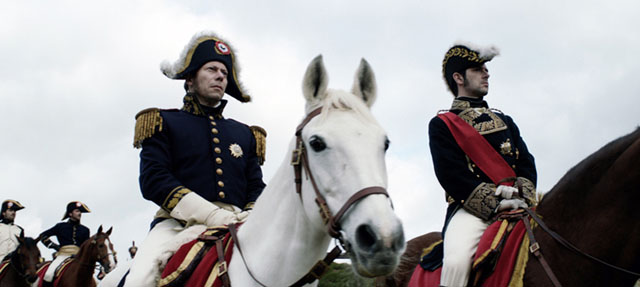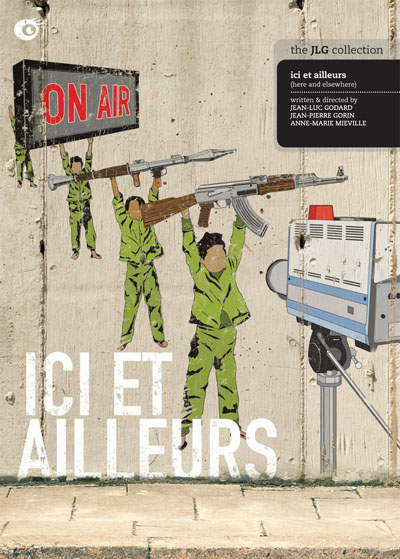“The 69th edition of the Venice Film Festival will run August 29 to September 8th, while Toronto will celebrate its 37th edition September 6-16. And then of course there’s Telluride, which goes down on Labor Day weekend.” IndieWIRE presents a list of 50 films they’re hoping to see at at least one of those festivals.

On the shortlist for Venice, according to Fabien Lemercier at Cineuropa, is Lines of Wellington, “by Chilean director Valeria Sarmiento, a project initially started up by her husband Raúl Ruiz, who died last summer, that features an impressive cast.”
More festival news. Leos Carax will receive the Pardo d’onore Swisscom at the Festival del film Locarno, which’ll also be showing his five features and staging a Q&A. Locarno artistic director Olivier Père posts his thoughts on Holy Motors, a critical favorite at Cannes this year. Locarno opens on August 1 and runs through the 11th.
Grady Hendrix posts a spectacular preview of the New York Asian Film Festival, running June 29 through July 15.
The Scotsman is all over the Edinburgh International Film Festival, running through July 1.
“The London Indian film festival opened on Wednesday with Gangs of Wasseypur, a two-part epic about criminal dynasties who control a mining town in the lawless state of Jharkand.” Nirpal Dhaliwal for the Guardian: “With its raw portrayal of a reality that never appears in the glossy utopia of Bollywood, it heralds a movement towards exposing the hypocrisies of Indian society about sex, drugs, development and injustice. And it’s a movement that is not going unnoticed: Gangs was the first mainstream Indian film to compete in the director’s fortnight at Cannes last month. The critics adored it.”
First Peoples Cinema, “the largest and most wide-ranging of its kind ever seen in North America, features key works from four countries that form the canon of First Peoples cinema: Canada, the United States, Australia and New Zealand,” and it’s on in Toronto through August 19. At Artforum, Jason Anderson has an overview.
“The films of António Reis and Margarida Cordeiro, just three features and a thirty-five minute short, are dear to the heart of the always vital legacy of Portuguese film making but so little known to American cineastes that they have often seemed like little more than rumors,” writes Nathan Rogers-Hancock at Cinespect. “Thankfully, Anthology Film Archives has programmed a series featuring not only their major work but also the work of their precursors and disciples, making this a commendable example of curatorial selection, not merely the public service of making these films available but actually putting forth an argument as to their continued relevance.” The School of Reis: The Films and Legacy of António Reis and Margarida Cordeiro is on through Thursday.
For Moving Image Source, Scott MacDonald talks with Ed Pincus about his Diaries (1971-1976) (1980), screening tomorrow at Light Industry in New York.
The 24th Onion City festival is on in Chicago through tomorrow and, in the Reader, Ben Sachs notes that the “rediscovery of history is a recurring theme of this year’s selections.”
“I trust this isn’t confusing,” writes Matt Prigge in the Philadelphia Weekly. “There’s the Philadelphia International Film Festival & Market and the Philadelphia Independent Film Festival. Both have similar names, both feature low-budget festival fare from around the world and both happen, mostly, at the same time, namely over the forthcoming weekend.”
In the Los Angeles Times, Jonathan Landreth presents a series of vignettes from the Shanghai International Film Festival.
Tod Browning’s The Unknown (1927) with Lon Chaney and Joan Crawford, screens tonight at the Alamo Drafthouse in Austin: “We’ve commissioned European-based ultra-inventive duo Les Freres Meduses to compose an original film score for two guitars and violin. They’ll perform it live with virtuoso violinist William Fedkenheuer (2nd violinist of the famed Miró Quartet!).” More in the Chronicle from Marc Savlov and Rachel Feit.
DVD/Blu-ray. “Emerging from a militant post-’68 phase, during which he formed the Dziga Vertov Group, in an effort to ‘make films politically,’ Godard developed a complex method of merging and pulling apart images, sounds and text—a dense, sometimes dazzling analytic approach that defines a significant portion of his work to this day.” Dennis Lim in the Los Angeles Times on two releases from Olive Films: “At once an auto-critique and an anatomy of the failures of the New Left, Ici et Ailleurs [1976] functions as a meta-political film, questioning the aims and methods of political cinema, and the effectiveness of filmed images as political tools…. Within the flashing, constantly morphing text that appears on screen in Numero Deux [1975] can be found a blunt summation of Godard’s larger project: At one point the word ‘politics’ changes to ‘history,’ which in turn becomes ‘cinema.’”
Criterion‘s restoration of Chaplin‘s The Gold Rush (1925) “puts all previous editions of this great film to shame,” writes Dave Kehr in the New York Times. Watch a video documenting the restoration.
Reading. “Psycho-geographically, the film career of Robert Siodmak seems to follow a similar path to Fritz Lang‘s,” writes David Cairns at the Chiseler, “from expressionist/realist dramas channelling modern angst in Germany in the ’30s, to a brief French interlude, to Hollywood and noir, pouring the anxieties of the post-war era into commercial cinema, then back to Europe and a perceived artistic diminuendo. But Siodmak’s work is more humanist and humane than Lang’s, or Hitchcock’s, and the transformations of his style more extreme, perhaps because from the beginning there were two Robert Siodmaks. With an oeuvre so obsessed with dual identities and doppelgangers, it’s natural to look for a schism in the filmmaker himself, and one immediately presents itself: Siodmak the social realist and Siodmak the dark fantasist.”
“Survey of a Sadist” is the title of a 1997 piece on Fassbinder that Jonathan Rosenbaum‘s just posted.
Zach Campbell suggests that Richard Linklater’s Bernie “demonstrates how a person’s summary is inextricable from his social commitments and dialogues, and that these apparatuses are not reducible only to the punitive register. (Or, to put it like a sociologist in the wake of May ’68, there is more to the society than the state. (elcpinellas.org) )”
The Film Society of Lincoln Center’s Eugene Hernandez looks back on the night that John Waters met one of his idols, Roger Corman. And Eugene’s got video of the onstage Q&A in Provincetown (15’28”).
In the works. At the Playlist, Ryan Gowland reports that, with Darren Aronofsky casting his Noah and both Ridley Scott and Steven Spielberg working on Moses projects, Paul Verhoeven has set up financing for Jesus of Nazareth, an adaptation of his book to be written by Roger Avary. And Kevin Jagernauth passes along news that Barbra Streisand will direct again for the first time in 16 years; Colin Firth and Cate Blanchett are set to star in Skinny and Cat.
“Tim Roth has signed on to star in Media Rights Capital’s TV series project Knifeman,” reports Deadline‘s Nellie Andreeva. “David Cronenberg is set to direct the pilot and executive produce the series, which centers on John Tattersall (Roth), a radical, self-educated surgeon who will go to unorthodox lengths to uncover the secrets of the human body.”
Also, Nicolas Winding Refn will direct and executive produce a television series “based on the character created by Jean-Claude Forest in a graphic novel and made famous in the 1968 sci-fi movie of the same name staring Jane Fonda as a sexpot tasked with finding and stopping the evil weapon inventor.” That’s right. Barbarella‘s coming to TV.
Derek Connolly and Colin Trevorrow, the writer and director, respectively, of Safety Not Guaranteed, will reteam for The Ambassador, reports Deadline‘s Mike Fleming.
Obit. “Character actor and venerable genre movie fixture Richard Lynch was found dead at his home…, news broken… by Rob Zombie, who cast Lynch in his 2007 remake of Halloween and his forthcoming The Lords of Salem.” Phil Dyess-Nugent at the AV Club: “After a stint in the Marines, the Brooklyn-born Lynch studied with the Herbert Berghof Studios and with Lee Strasberg at the Actors Studio in the late ’60s, eventually working with Al Pacino on David Rabe’s Vietnam play The Basic Training of Pavlo Hummel. The production got sidelined when Pacino’s movie career unexpectedly took off, but Pacino arranged for Lynch to make his movie debut alongside him in Scarecrow (1973), the first film he made after finishing The Godfather.”
For news and tips throughout the day every day, follow @KeyframeDaily on Twitter and/or the RSS feed. Get Keyframe Daily in your inbox by signing in at fandor.com/daily.




